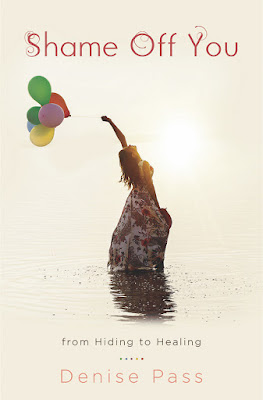Weeping May Last for a Night
*Be sure to enter to win your own copy of
Shame Off You at the end of this blog post!*
Weeping May Last for a Night
Excerpted from Shame Off You by
Denise Pass, ©2018 Abingdon Press
What
is it about crying that makes us feel shame? We are shamed for being less than
perfect, then doubly shamed for crying out for help about it. Sounds like a
serious plan of condemnation from the enemy! But what looks like weakness
becomes a secret source of strength for those who know and trust in God.
For
the record, crying has been given a bad rap. Weeping in cultures all over the
world is deemed something to be embarrassed by. Goodness, we even apologize
when we do it. Showing emotion is often seen as a sign of weakness, sometimes
associated with mental or personality disorders. Add the sting of shame to the
feelings of inferiority for just expressing emotions, and the overwhelming
humiliation begins to paralyze us and affect our ability to function. Getting
to this place of crying out is made even more difficult with the lingering
shame for doing so.
But
there is another type of crying. Set aside the helpless, I’m-so-ashamed crying.
Instead, there is a sweet place of brokenness where we cry out and look to God
for comfort. And it is in crying out to God from our place of shame that we
obtain victory. Admitting our need is not a display of weakness, but a
testament of relationship. But it can be so very hard to admit that aching
need. God made us for relationship, to know Him intimately. We were not made
for independence, but dependence upon our loving God. There is no shame in
that. When we cry out to God, He helps us to recognize the oppressive presence
of shame, so we can rightly deal with this stigmatizing emotion.
In
Scripture, Hannah felt the scorn from shame in being childless. She knew all
too well the taunts of those around her, especially from a rival wife. She wept
at the altar. She was not enough. She could not bear children. And there was
nothing she could do about it. This is a classic situation of shame.
Circumstances we cannot control, yet we somehow accept the shame as if we
earned it. But Hannah had a weapon. She cried out to God—the only One who could
truly remove her shame. And God answered. Sometimes we have to wait for the
Lord to restore. We may have to walk through shame to be able to appreciate the
shame being removed from us. Hannah’s tears were counted that day, and the
priest serving in the church saw her too:
Hannah was in deep anguish, crying
bitterly as she prayed to the Lord. And she made this vow: “O Lord of Heaven’s
Armies, if you will look upon my sorrow and answer my prayer and give me a son,
then I will give him back to you. He will be yours for his entire lifetime, and
as a sign that he has been dedicated to the Lord, his hair will never be cut.”
As she was praying to the Lord, Eli watched her. Seeing her lips moving but
hearing no sound, he thought she had been drinking. “Must you come here drunk?”
he demanded. “Throw away your wine!” “Oh no, sir!” she replied. “I haven’t been
drinking wine or anything stronger. But I am very discouraged, and I was
pouring out my heart to the Lord. Don’t think I am a wicked woman! For I have
been praying out of great anguish and sorrow.” “In that case,” Eli said, “go in
peace! May the God of Israel grant the request you have asked of him.” “Oh,
thank you, sir!” she exclaimed. Then she went back and began to eat again, and
she was no longer sad. (1 Samuel 1:10-18 NLT)
There
is so much to learn from Hannah when we are surrounded by shame. She did not
try to fix her situation. She did not try to cover up her shame. She simply
went to the only One who could. And she wept before her great God, surrendering
to His will. But she also did something astonishing in her prayer—she was not
merely looking for the release of shame. She wanted to honor God for His
removal of it. She would give her son back to Him. Our shame never really is
about us after all. It might feel like it, but we feel shame until we come
before God. Like a magnet, shame draws us either nearer to God or propels us
away. Hannah knew where her help truly came from. She clung to God and let go
of her shame. She also knew that the one who commands armies—El Shaddai—could
surely remove shame off her soul. She demonstrated this by leaving her shame
there at the altar. She did not carry it anymore.
There
are many such altars every Sunday where people have the bravery to come up out
of their seat and lay their burdens and shames down. The very public
transparent display of my shame on that altar initially hurt so deeply. Like
Hannah, I did not hold back. It led to confessing the secrets hidden within,
the very thing I never wanted to mention again. There I shared what I had been
prevented from sharing before. And instead of finding shame and pressure, I
found acceptance and compassion. Somehow, I had thought concealing my shame
would make my own unwanted testimony disappear. Surely the scorn and
condemnation I felt would someday be removed. But hiding shame does not heal
it; it makes it multiply. Shame has taken on many forms in my life and colored
my world with guilt and humiliation. Shame screams out “condemnation” to a
weary soul too tired to fight the accusation. It tries to define us, but we can
rise above shame. Shame impacts us all, but it is how we deal with shame that
determines the lasting impact shame has on our life.
Shame
seems insurmountable and hopeless to us when we listen to it. But that’s what
shame does. It makes it seem like there is no way out. Trapped within the walls
of our own mind, we don’t even recognize all the shame we are bound by, but we
try to combat this shame through our own devices, nonetheless. We might not
even be cognizant of our own approaches to deal with shame. Maybe we
rationalize it or try to ignore it, but underneath we let shame chip away at
our worth. We consider and turn the matter over in our mind a million times,
trying to cast off the yoke of shame. Perhaps we allow bitterness to overtake
us as we seethe at those who hurt us or who are judging us. Self-made
strategies and techniques lack sustaining power to remove an entrenched,
invisible force such as shame. Nice anecdotes and willpower cannot extinguish
it, either. In all our struggling with shame, could it be that God has a better
way to remove shame and that He can even use its presence in our lives for
good?
Denise Pass, author of Shame Off You, is an
award-winning CCM recording artist and singer-songwriter, accomplished
writer/blogger, speaker and worship leader at women’s conferences as well as a
worship leader on staff at her home church. After a crushing discovery of her
former husband’s hidden life as a repetitive sex offender, and surviving a
painful divorce, she now shares an inspirational message through her ministry,
Seeing Deep Ministries, about seeing the deeper truth in God’s word when life
hurts. Denise also founded and directed a home educational co-op for 12 years
and engaged in many educational pursuits, including forming and directing a
classical children’s choir. A graduate from the University of Maryland, Denise
now resides in Virginia, with her “Kinsman Redeemer” husband and five children.
Find her online at DenisePass.com.



Comments